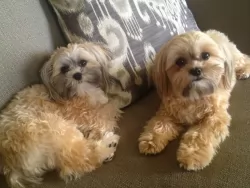 MyDogBreeds
MyDogBreedsBoth Shorkie and Other are originated from United States. Shorkie may grow 66 cm / 25 inches shorter than Other. Shorkie may weigh 110 kg / 242 pounds lesser than Other. Shorkie may live 5 years less than Other. Shorkie may have less litter size than Other. Shorkie requires Moderate maintenance. But Other requires Low maintenance
 The Shorkie is a mix between a Yorkshire Terrier and a Shih Tzu. This little dog actually thinks he’s quite big. He is a great watchdog and a barker, and he is a loyal and loving member of his family. He will let you know if he thinks something is going on that shouldn’t be.
The Shorkie is a mix between a Yorkshire Terrier and a Shih Tzu. This little dog actually thinks he’s quite big. He is a great watchdog and a barker, and he is a loyal and loving member of his family. He will let you know if he thinks something is going on that shouldn’t be.
This hybrid combines two breeds known for their good looks, cuteness and personalities. Shorkies get their watchdog instincts and their loyalty to their people from the Shih Tzu and their personalities and good looks from the Yorkie. This designer breed has no known standard and every puppy is different, but traits from its founding breeds will remain. Both breeds have great personalities.
Regardless of the differences within the litter, because the personalities and adorableness of the two founding breeds are equal, all of the puppies will have those characteristics. They will all be energetic, playful and think they are big dogs. They will all love people and especially kids – playing and watching over them.
The Shorkie is intelligent, trainable, and snuggly. They will also have the stubborn trait that the two founding breeds can show at times. Developed in the United States, this crossbreed is extremely popular even though they have been in existence for only ten years or so. Breeders in the U.S. began to mix these two breeds in order to develop a cute, friendly and intelligent little dog that will cuddle on your lap – perfect lap dog.
Even if we already have breeds similar to the Shorkie, its development allows breeders to diversify and improve the genetics of the dogs. It is important that these be responsible breeders whose intentions are not financial but to legitimately improve the positive traits of each breed while sorting out the undesirable or weak traits. This is the positive side of the new designer breeds.
Even though it is still being developed, at least the Shorkie seems to be a success story for designer breeds as a loving, popular little dog. It will take a lot more time and a lot more development before the Shorkie becomes an actual recognized breed. At the moment it remains a hybrid, a crossbreed, a so called designer dog.
It will be at least 7-10 generations of careful and quality breeding before the Shorkies are potentially recognized as its own pedigree breed. It is important to breed Shorkies to Shorkies in order to develop a standard that could be accepted for a new breed by the AKC and UKC. Over time the puppies must become more and more standardized in their conformity to that new breed standard. Their physical appearance and their temperament will be standardized. At this stage the second generation of Shorkies is rare. Their popularity is rising in the United Kingdom. Both Britain and Ireland have a growing interest in this hybrid.
Dog lovers are thrilled because there is such diversity to choose from when looking for a pet.
There are so many other dogs that don’t have any particular breed name, and these can be tiny dogs or massive dogs that you would have to think twice about before buying one, as a large dog can eat you out of hearth and home.
All dogs, pedigreed or other, have descended from the wolf but it is unsure about when dogs were actually domesticated. One thing is sure, it is amazing to think that dogs descended from wolves but that you get so many varieties to day – different sizes, different coat colors and lengths, some have erect ears, others floppy, some are lean and mean and others muscular and heavily-set. They have all originated from different parts of the world.
There are well over 100 different pure dog breeds as well as plenty of other dogs. In fact you can create many different dogs by breeding certain of them to get the looks and characteristics you want.
 The Shorkie, being a cross between the Yorkshire Terrier and the Shih Tzu, and as such has physical and temperament characteristics from both breeds. They could be 50-50 but most likely each puppy will be more like one of the founding parents than the other. Because there is a lot of similarity between the founding breeds there is a lot of similarity between the Shorkies.
The Shorkie, being a cross between the Yorkshire Terrier and the Shih Tzu, and as such has physical and temperament characteristics from both breeds. They could be 50-50 but most likely each puppy will be more like one of the founding parents than the other. Because there is a lot of similarity between the founding breeds there is a lot of similarity between the Shorkies.
Their hair is either wavy or straight, but it is soft. It can be a wide variety of colors and usually they have a darker mask on the face. Usually they have the eyes of the Shih Tzu – large -but not protruding. Their muzzle is short, and the skull is round with triangle ears. Their bodies are compact, small with plenty of muscle for their size. They also have fine bones and short legs, with a thin curled tail.
Dogs today come with so many looks. ‘Other’ dogs are vast and varied. They may be pedigreed dogs that are ‘off the radar’ or they may be among the many ‘cross-breed’ dogs there are.
You can get a tiny Chihuahua, measuring just 9cm in height, but you can also get a huge dog like the Great Dane that can stand at up to 90cm in height. It isn't however, a heavily built dog like the giant Newfoundland which can weigh up to 117 kg or so.
Some dogs are intelligent, others not so much. Others are social and others more reserved. Some won’t be able to tolerate being cooped up indoors and not being able to be outdoors involved in an activity, while others are more indoor dogs.
Some dog are friendly, others indifferent, some boisterous and sporty, others docile and lazy. There are so many other dogs that don’t make the pedigreed list, but they’re adored by their human family for being so utterly unique.
There are so many dogs, some are pedigree dogs and some aren’t. Some dogs are registered with kennel clubs and others aren’t.
Every dog has some amazing characteristics that make them so adorable. These kennel clubs divide dogs into categories such as Terriers, working dogs, herding dogs, toy breeds, hounds and so on. Pedigree breeds belong to these groups.
Other dogs are just as special, even if they don’t fall into the many dog breeds recognized by major kennel clubs.
There are so many other dog breeds, and if you want to bring some canine magic into your home and heart, apart from the very many expensive dog breeds out there, there are other dogs.
These are hybrids or true one-of-a-kind pavement specials that come at a fraction of the price but with the most amazing and wonderful characteristics you can imagine and which will make a most splendid pet.
 Many hybrids are in better health at least genetically than their parent breeds. Responsible breeders will breed any genetic issues out of their puppies. Still there are many health issues that the Shorkies are prone to. These include:
Many hybrids are in better health at least genetically than their parent breeds. Responsible breeders will breed any genetic issues out of their puppies. Still there are many health issues that the Shorkies are prone to. These include:
• Brachycephalic Airway Syndrome – “smashed face” causes problems with breathing, heat, flying and more.
• Glaucoma – Yorkshires have this, and it can be secondary to the lens Luxation.
Other dogs are considered somewhat healthier than purebred dogs because they come from a broader gene pool. Nonetheless you still need to be aware of certain dog illnesses that your dog can develop -
This is a common ailment in dogs, and skin allergies can cause your dog a lot of discomfort and pain. They lick and lick and aggravate the situation. Sometimes fleas, chemicals and dog shampoos can aggravate the skin too. There are several things to look at – from making environmental changes to changing your dog’s food.
Cancer is common in dogs, just as in human beings, with there being a number of different cancers. Whenever you brush your dog, run your hands over him to check if there are any unusual lumps on him and have them examined if you do discover a lump.
Other dog illnesses to watch out for include bloat, ear and eye infections, cataracts, hip dysplasia and obesity, among others.
 1.Feeding the puppy - The Shorkies need a high-quality, well-balanced dry kibble. Make sure it is a formula for small, active dogs. It should have lean meat and essential minerals and vitamins. Make sure it is puppy food not adult. The puppy needs 300 -550 calories a day in 3 meals.
1.Feeding the puppy - The Shorkies need a high-quality, well-balanced dry kibble. Make sure it is a formula for small, active dogs. It should have lean meat and essential minerals and vitamins. Make sure it is puppy food not adult. The puppy needs 300 -550 calories a day in 3 meals.
2.Feeding the adult – Obesity is a problem for the Shorkie as it is for many small dogs. Don’t overfeed your adult but give her the same kind of high quality small breed dog food, only for adults. They need about 200-300 calories a day in 2 meals.
4. Games and Exercises – These are very active little dogs and need exercise every day. They needs walks, games, and time with you. They also love to cuddle with you at the end of the day. They love squeaky toys and playing fetch outside or inside.
Responsible dog owners know that their dogs require adequate food and water, lots of love and attention, exercise, a warm, dry bed, shelter from the elements when outdoors and medical attention when they’re sick.
One advantage with other dogs which aren’t pedigreed, is that by their very nature, they have good genetic diversity, and this means good overall health. Other dogs breeds are generally cheaper to buy and cheaper in terms of vet’s fees as they tend to be healthier.
Other dogs have a variety of different coat types, so whatever dog you have, you’ll need to be looking at brushing him, stripping him or having him professionally clipped. Whether erect or floppy ears, check inside for infection. The eyes will also need to be checked for infection and other eye ailments. All dogs will also have to have their nails clipped.
The size of all dogs, pedigree or other will determine the amount of food you give him. Big or small, pedigreed or other, every dog wants the same when it comes to diet. They want food which is nutritious, tasty and simple. They want a high quality commercially manufactured food high in minerals and vitamins.
They will benefit from some raw meat added into the kibble whenever its possible. They will also require some home-made food – simple, uncomplicated homemade food such as boiled chicken, brown rice or pasta and vegetables such as sweet potato, carrots and spinach. Such a diet will keep your pet free from digestive problems. Make sure he has a constant supply of cool, fresh water.
Exercise is important for every dog, but some dogs will require more exercise than others. Some dogs will be content with a walk every day while others will require far more – running beside you while you cycle, swimming, a run in the park, rope- and ball games and going with you on hikes.
Exercise is both entertaining for your dog and healthy too.